
Final picture from the Digital Feedback conference, showing an exhausted but happy TESOL team.
Digital Feedback in Research and Practice -
International and Interdisciplinary Conference at Chemnitz University of Technology
From June 29 to 30, 2023, the first international conference on “Digital Feedback in Research and Practice” took place in a hybrid format at Chemnitz University of Technology. Participants were able to join the event online in BigBlueButton or on-site in the New Lecture Hall “Orangerie” at the campus Reichenhainer Straße 90, Chemnitz, in Germany.
The conference was organized by the Junior Professorship TESOL / Advanced Academic English (Assistant Professor Dr. Jennifer Schluer and team) and attracted wide interest among researchers, students and teaching staff from different disciplines and educational institutions.
Technology-enhanced and technology-generated feedback processes have become increasingly important in recent years, not the least due to the proliferation of online and hybrid teaching since the Covid-19 pandemic as well as due to the remarkable developments in the field of Artificial Intelligence (AI). Already before the pandemic, Assistant Professor Dr. Jennifer Schluer has been active in the field and published the book Digital Feedback Methods (2022). She has been granted a Digital Fellowship by the Saxon State Ministry for Higher Education, Research and the Arts and a fund for the project “Pedagogical Guidance for the Use of Digital Feedback: Digital Feedback Map” by the Stiftung Innovation in der Hochschullehre.
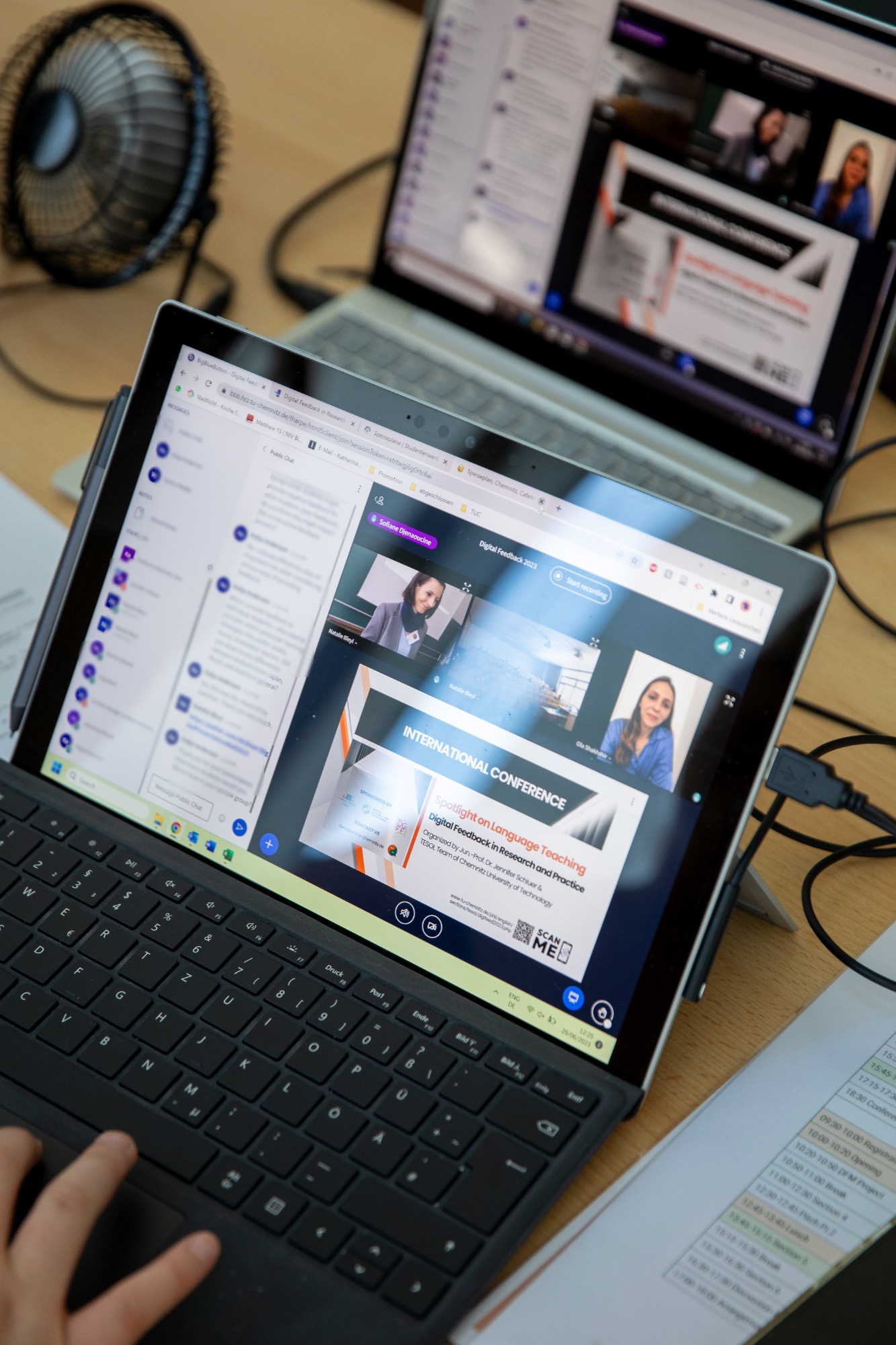
© Photo by Natalie Bleyl
At the two-day conference, 28 presentations underscored the thematic breadth and practical relevance of digital feedback in education. In addition to the conference opening and conference closing speech, there were
- 19 presentations reporting about research projects and teaching practices,
- 5 pitch presentations of teaching ideas,
- 4 poster presentations.
The presentations were organized into six thematic sections, offering mutually enriching perspectives:
- Audio-Visual and Multimodal Feedback
- Automated Feedback and Automatic Corrections
- Open AI, iCALL & Robot-Assisted Feedback
- Digital Feedback Literacy: Teacher and Student Perspectives
- Pedagogical Feedback Designs and Teaching Reports
- Interdisciplinary Insights on Digital Feedback
The participants either joined online or on-site to give a live presentation. Some had recorded their presentations beforehand to ensure that their contribution can be played despite unpredictable electricity and internet availability (notably from Ukraine and South Africa).
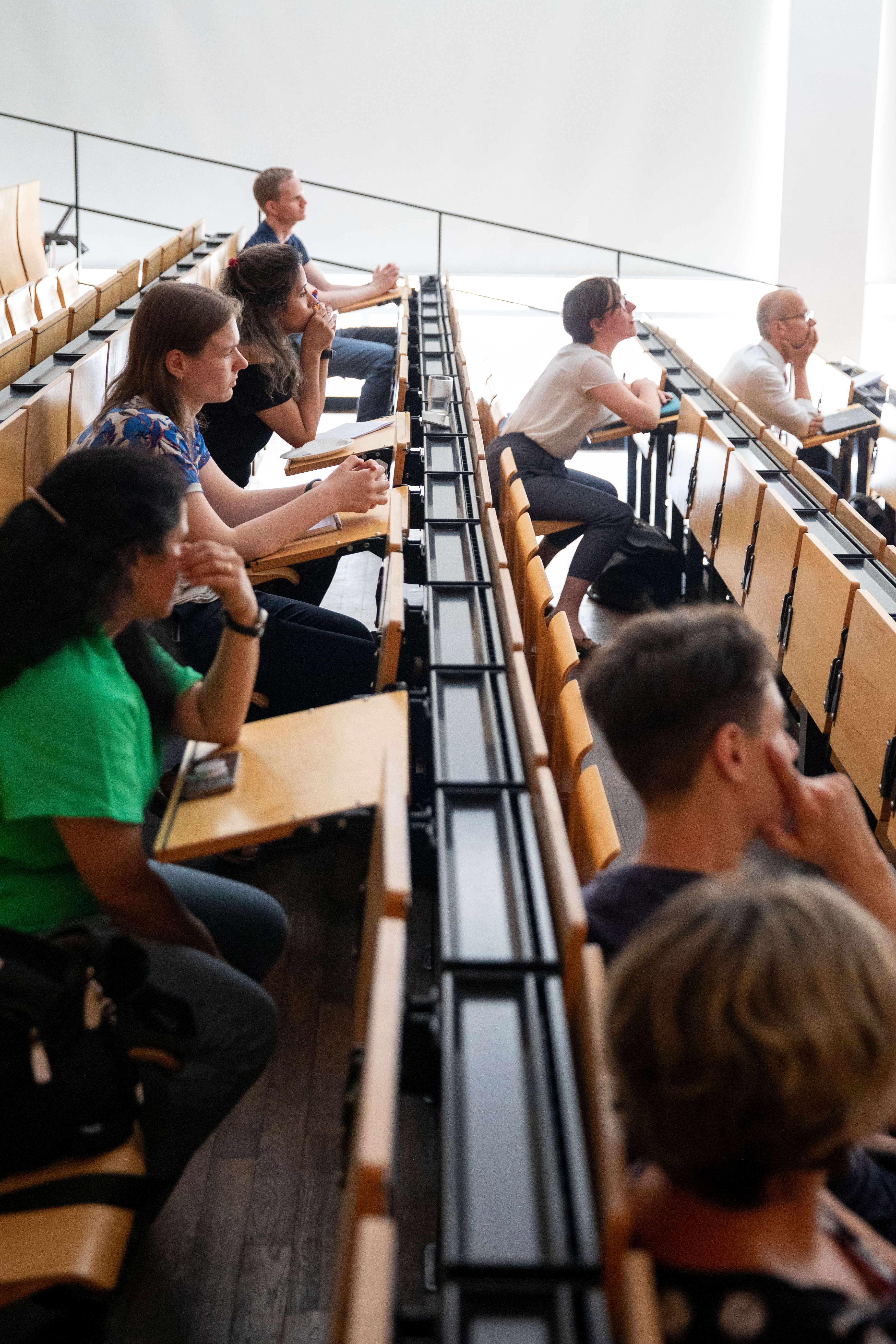
© Photo by Natalie Bleyl
Altogether, the program offered rich insights into research and teaching practices by presenters from Turkey, Ukraine, Iran, China, Palestine, Russia, Singapore, South Africa, India, the United States, as well as Germany, Austria and Switzerland. The presenters reported about different aspects of foreign language pedagogy, enriched by insights from learning psychology as well as literary and media studies. They contributed to the understanding of various digital feedback tools and methods from diverse perspectives, including both learners and teachers in face-to-face and online learning environments. Furthermore, the hybrid format enabled the participation from audience members all around the world to engage in lively discussions with other online participants or on-site attendees.
The following sections will provide more information about the thematic scope that was discussed at the “Digital Feedback” conference (for the full program and book of abstracts, visit the conference website).
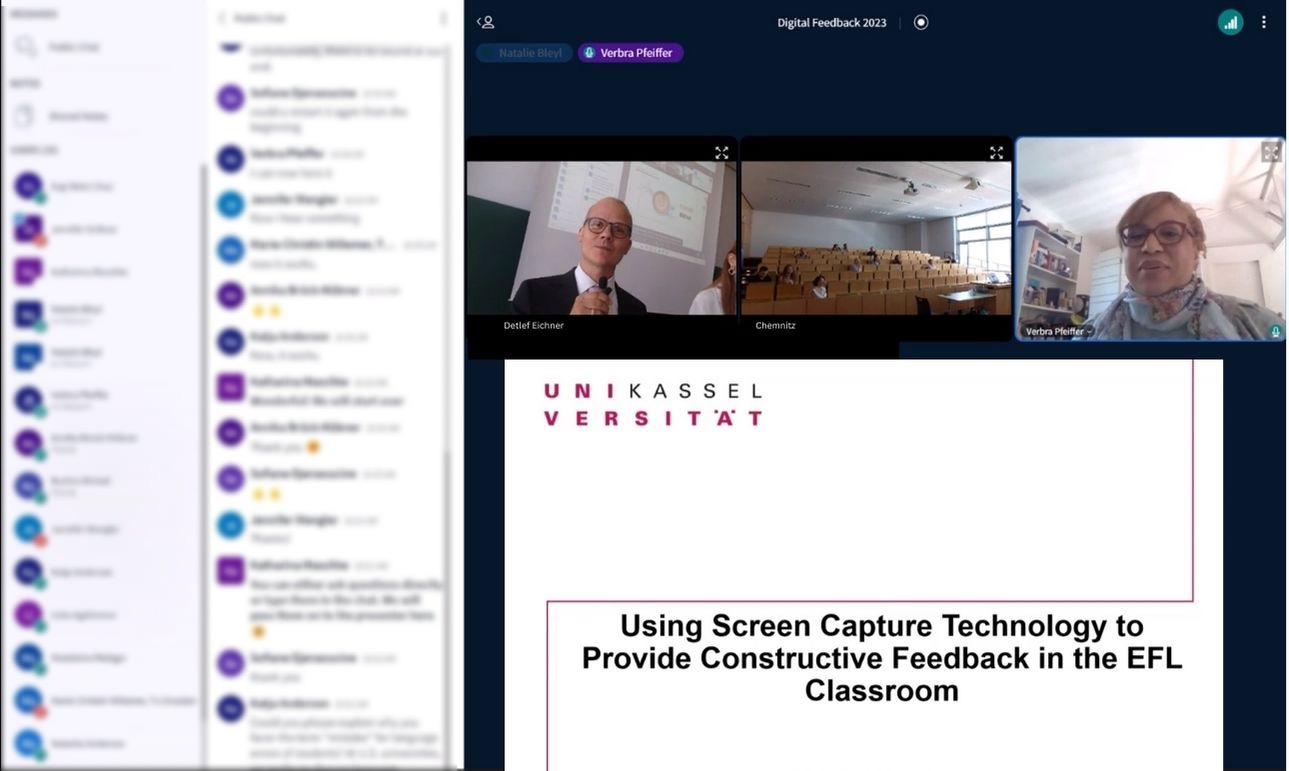
© TESOL TUC
In the thematic section of audio-visual and multimodal feedback, the first group of presenters exemplified the utilization of screen capture feedback for the development of writing skills in the EFL (English as a foreign language) classroom (Detlef Eichner), explored the effects of self- and peer-annotated video feedback for the improvement of metacognition (Sumeyya Sarikaya), and analyzed error frequencies and (non-)corrective feedback provision in two types of videoconferencing, i.e. studio-based and desktop videoconferencing (Julia Lankl).
The second group of presenters in the thematic section of automated feedback and automatic corrections drew attention to the affordances and limitations of technology-generated feedback from teachers’ and students’ points of view. The presenters explored writers’ cognitive, behavioral and emotional engagement with technology-generated feedback (Ralf Gießler), and discussed learners’ emotional perception of feedback in mobile language learning apps, including issues of accuracy and audiovisual effects (Jennifer Wengler). In addition, video-recorded audiovisual translation was explored as a means of immediate feedback for foreign language learners (Nataliia Saienko & Ganna Sozykina).
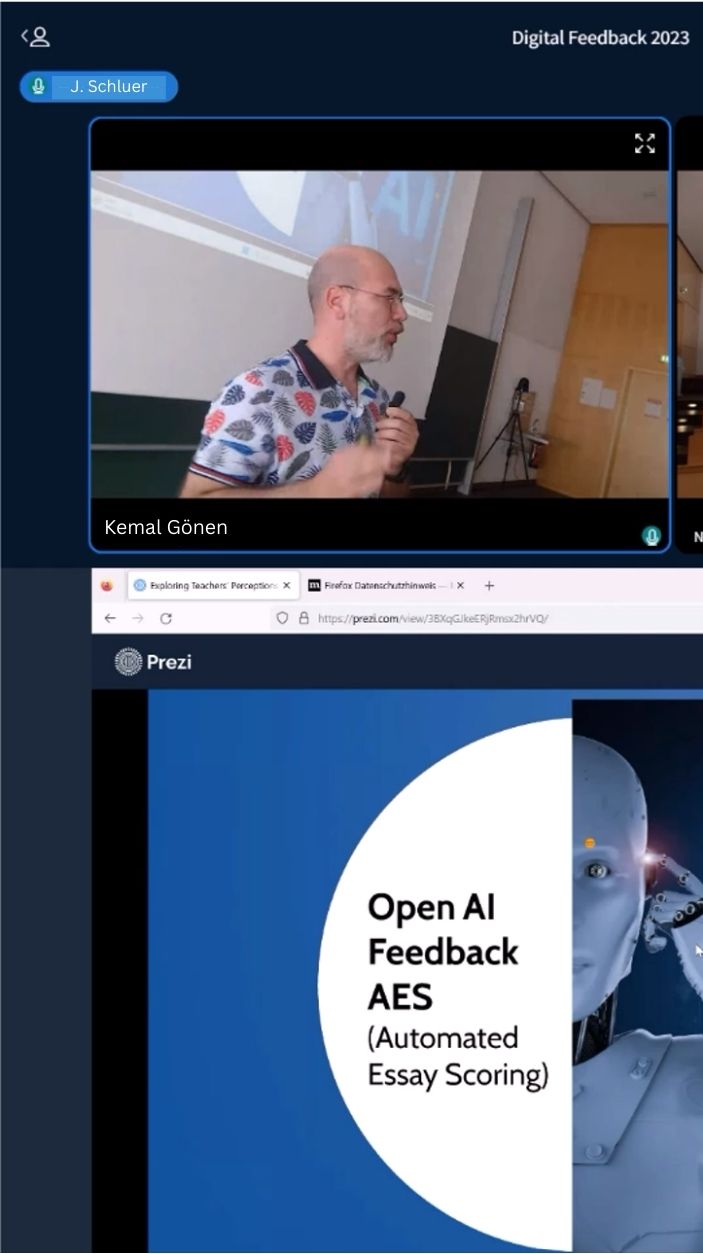
© TESOL TUC
In the third thematic section of Open Al, iCALL & robot-assisted feedback, the presenters showcased the utilization of ChatGPT for the generation and application of assessment rubrics on students’ writing (Kemal Gönen), discussed the strengths and weaknesses of a variety of intelligent computer assisted language learning applications with regard to personalized feedback provision (Bushra Ahmad & Mohammad Rizwan Khan), and suggested research avenues for using different feedback modes of humanoid robots to improve the learning of ADHD students (Mina Raeisi Nafchi).
In the fourth section, the focus was set on the digital feedback literacy of teachers and students. The presenters highlighted the important role of teachers in encouraging students to express their feedback needs (Annika Brück-Hübner), provided insight into digital teaching and feedback processes in large classrooms (Verbra Pfeiffer), and emphasized the importance of various facets of learners’ and teachers’ digital feedback literacies, for example with regard to languages for specific purposes (Olivia Rütti-Joy).
Elaborating on these ideas, the fifth group of presenters discussed pedagogical designs to foster dialogic feedback in synchronous and asynchronous digital modes, both in face-to-face and online classrooms (Katja Anderson & Natasha Anderson), investigated the effects of digital feedback activities to foster pre-service teachers’ self-efficacy in a curriculum planning course (Yarong Liu), and explored learners’ perceptions of criteria-based peer feedback in online DaF (German as a foreign language) exam preparation courses (Ines Paland-Riedmüller & Simone Weidinger).
The final group of presenters provided interdisciplinary insights and further contributed to understanding the development and enactment of digital feedback literacy. Notably, they explored the utilization of apps for goal setting and time management to create a more efficient and self-regulated learning experience through feedback on study time (Manuel Schmitz, Jenny Rettstatt, Markus Suren, Daniel Brand, Katharina Jahn, Günter Daniel Rey & Marco Ragni).
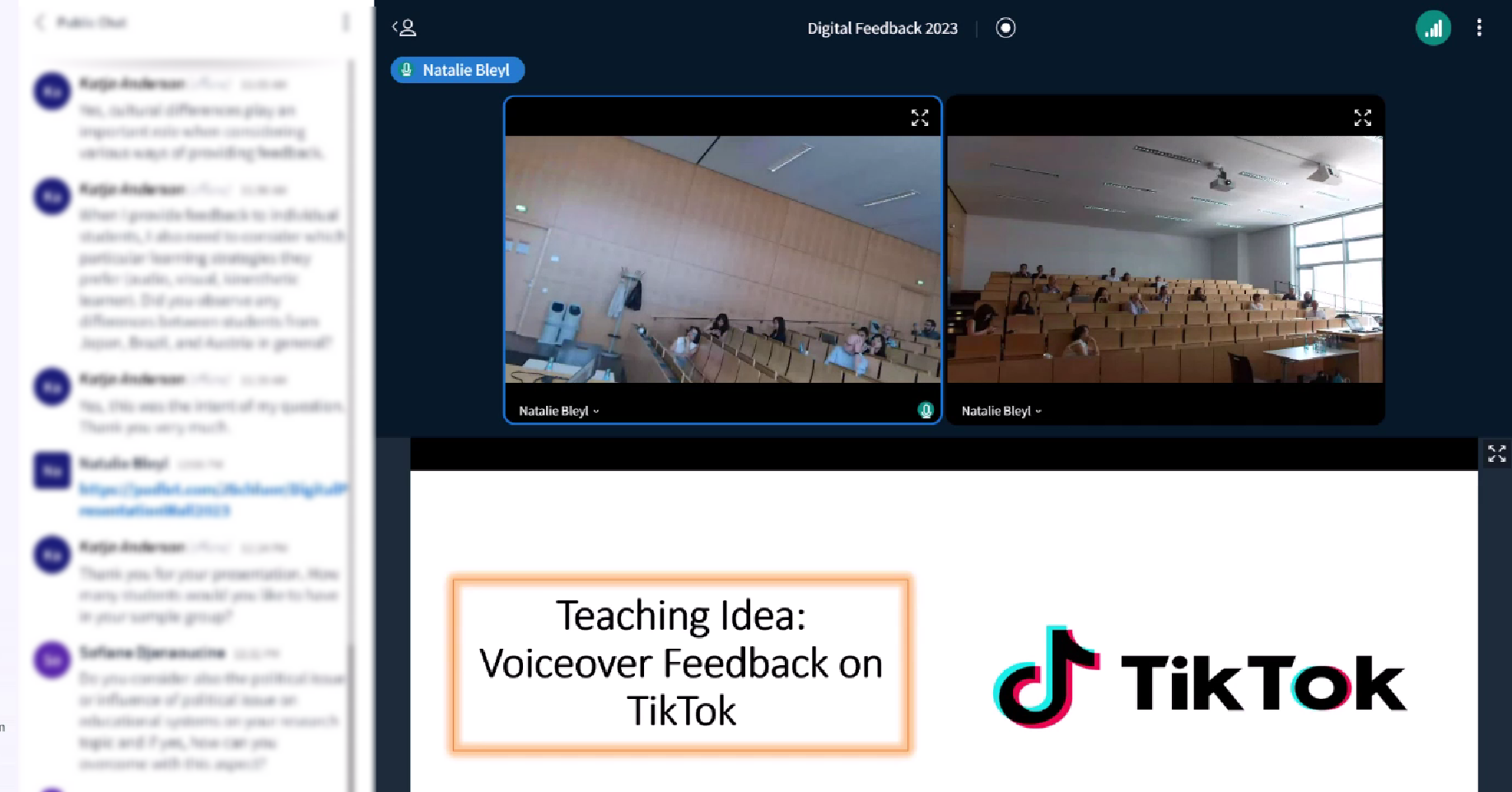
© TESOL TUC
Additionally, pitch presentations of teaching ideas were held by international PhD and Master’s students from Chemnitz University of Technology. The presenters offered myriad ways of integrating technological tools for the provision of feedback, including tandem learning and feedback in videoconferencing (Amanda Chng), digital feedback portfolios on Google Sites (Ola Shakhshir), as well as possible feedback procedures on the platforms Flip (Polina Gantman), TikTok (Erhan Altay) and Instagram (Ezgi Irem Bekci).
The conference also included presentations of initial findings from Dr. Jennifer Schluer’s research about peer screencast feedback in English language teacher education as well as about the use of synchronous and asynchronous digital feedback methods that are part of the project “Pedagogical guidance for the use of digital feedback: Digital Feedback Map”, which is funded by the Stiftung Innovation in der Hochschullehre. Finally, four poster presentations provided additional insights into these projects in a bilingual manner.
Further information: Conference Website
